(Cover photo - credit @loiclemay)
Yesterday I had the pleasure to attend the E1 conference, in Toulon. This one day conference was dedicated to problem solving and the talks were oriented towards the main difficulties web entrepreneurs might have faced.
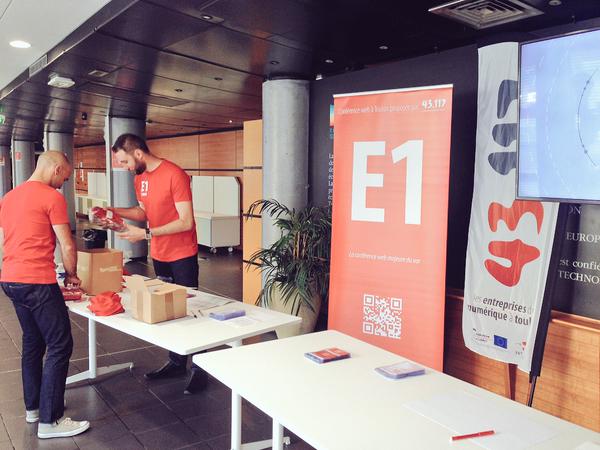 E1 staff is preparing badges before the conference and Credit photo : @ThomasGabelle
E1 staff is preparing badges before the conference and Credit photo : @ThomasGabelle
Live Broadcast
We had one track with 11 talks in French about personal experience and feedback from past projects which have faced major problems. The talks were recorded and broadcast live with our partner Bizeo.net. I guess that replays will soon be available (and I’ll try to edit this post when it’ll be the case).
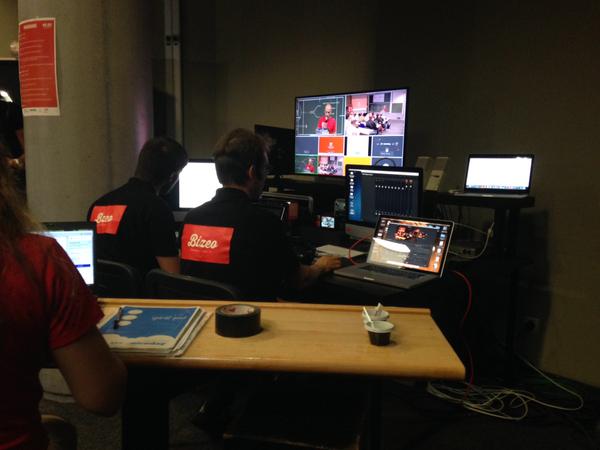 Bizeo Live TV in house at E1 Conference - Credit photo : @NicolasLequeux1
Bizeo Live TV in house at E1 Conference - Credit photo : @NicolasLequeux1
Talks
I’d try to write a brief summary for each talk. I got really interested in four of them, but the others were quite entertaining. Overall, the schedule was respected and the host (@providenz) was really good at keeping the perfect pace between questions and the next speaker.
Travail en mutation
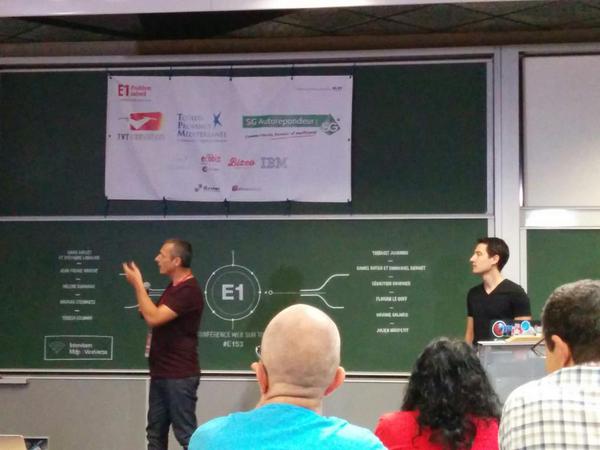 David Larlet and Stéphane Langlois at E1 Conference - Credit photo : @etalab
David Larlet and Stéphane Langlois at E1 Conference - Credit photo : @etalab
David Larlet (www) and Stéphane Langlois (@langlois_s) were opening the conference with a keynote called “Travail en mutation” (Changing the way we work) : they listed various benefits of remote work and showed several surprising coworking spaces in France.
Les 8 étapes pour passer de 0 à 100 clients
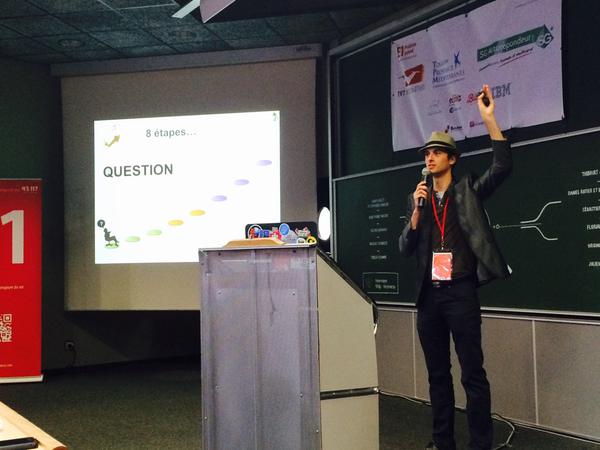 Sébastien Gourrier at E1 Conference - Credit photo : @lauramabille
Sébastien Gourrier at E1 Conference - Credit photo : @lauramabille
Sébastien Gourrier (founder of http://sg-autorepondeur.com a French Drip email SaaS) gave us a list of 8 steps that he followed to reach a thousand recurring customers.
At the end of the talk, he offered us a link to two resources about a more detailed story (“20 minutes are far from enough to tell you everything” he said). Guess what, these two links are landing pages that will ask for your email in exchange of the PDFs. On my blog, I will probably soon tell you a lot more about drip marketing and some psychological levers you can use to convert readers to become customers.
Le standard comme input de veille technologique
The second talk was held by Virginie Galindo (www - @poulpita) a W3C advisory board member and Gemalto employee. She advocates for “Curation about standards” : as she explains, it’s better to be aware about the most recent decisions in our field of expertise. People discussing are “friendly people” she added, so don’t mind asking questions to them about the last development.
I have spent some time in the past on the schema.org Standardization mailing list. But discussions are held in a too fast pace for me. As I need to be doing things for my own project, I can’t spend that time with people whose job/mission is too establish and maintain standards. I totally respect their jobs and we need them, but my opinion is that it’s more a full-time job than a hobbie.
Virginie was giving credit to this, when, at some point of her talk, gave us a “recipe” for a first-time standard-curation. It was like 30 hours or so.
Startup : on s’est planté parce qu’on avait trop d’argent
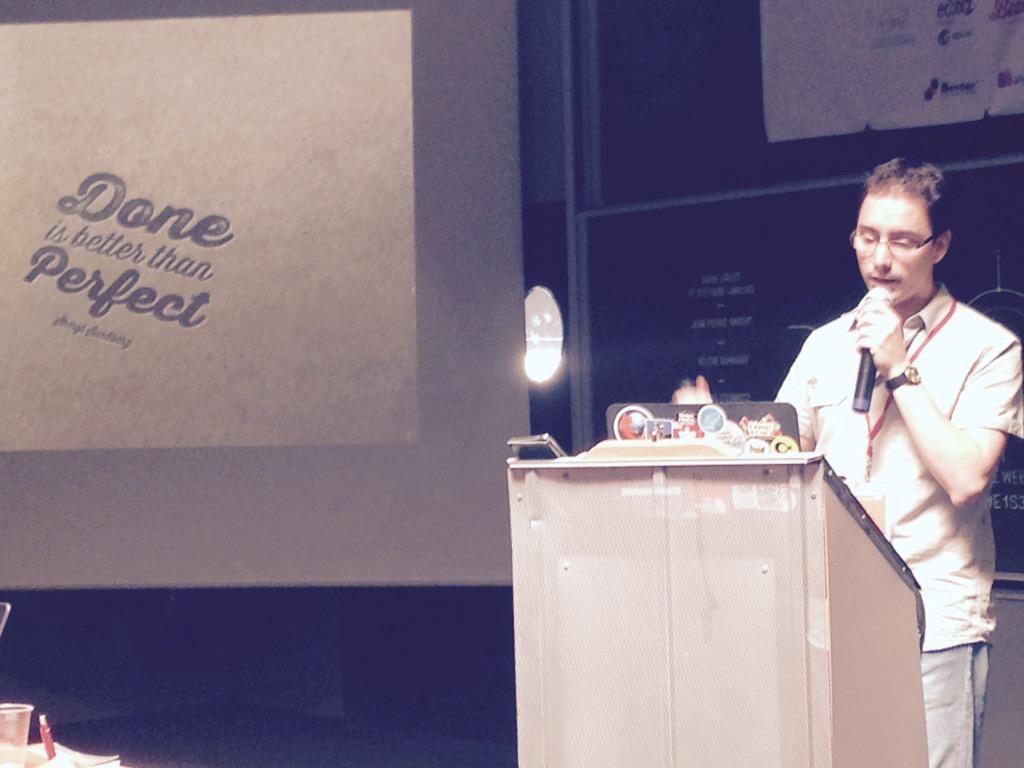 Jean-Pierre Vincent E1 Conference - Credit photo : @fidjey
Jean-Pierre Vincent E1 Conference - Credit photo : @fidjey
Jean-Pierre Vincent (@theystolemynick) named his talk “We failed because we had too much cash” . That’s the kind of title which automatically draw your attention.
Basically, JP described the issues they faced after the first fund raising. Their two investors were not web/software oriented people, they made money in hard tech. The dev team wanted to work more or less according to the lean methodology but the two investors were not ready to test the product on market until it was all done and shiny. Because of that, the team lost 2 years in developing top of the edge features, while competitors were winning market shares. When the first public release occurred, no one wanted the product anymore.
We failed because we had too much cash
Click to Tweet
I was attending a talk from Jean-Pierre for the second time, and he is really a nice speaker. If you have the choice to attend a talk from him, don’t think twice, you’ll love it.
Le généraliste : orchestrateur du succès de vos projets
Nicolas Steinmetz (www - @nsteinmetz) had a kinda high level presentation about the benefit of having full stack employees in your team. Though it’s really similar to the headline of my homepage, I am a big fan of this new concept. I love full stack team or full-stack managers, but why should we have full-stack employees.
If you are bootstrapping your startup, a task is a task, and if you don’t have the HR to cover it, you need to do it yourself. That’s perfectly legitimate. However, once you get a team to work with you, why would you need people to compete for the same skills, instead of being complementary. If Alice and Bob are both doing fine in marketing or coding, it means that none of them is really the expert and none of them can take THE decision when it’s required : they simply are not legitimate.
User Experience : comment fidéliser les internautes
User experience and interfaces are topics I appreciate a lot. Teresa Colombi (@colombi_tex) was there to introduce people to the stakes of UX for todays online businesses. She also introduced the concept of gamification (more about that on that blog on day) and examplified with this famous video of Stockholm, Odenplan underground piano experiment :
If you want people to perform some actions, gamification is a powerful lever. If you’re running a web startup, that’s something you can often use during user onboarding (though it’s not common enough yet).
If you want people to perform some actions, gamification is a powerful lever.
Click to Tweet
Se lancer dans le web sans rien y connaître
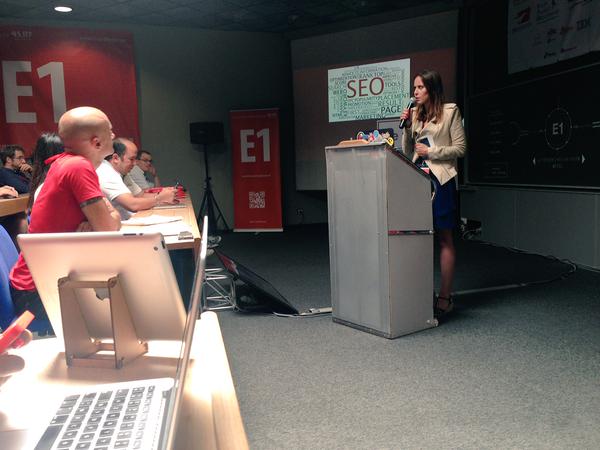 Hélène Quaniaux E1 Conference - Credit photo : @ThomasGabelle
Hélène Quaniaux E1 Conference - Credit photo : @ThomasGabelle
Hélène Quaniaux (Meet my Job - @helenequaniaux) is not the common web entrepreneur. You often hear about people entering the industry after years in a different job or position. But they usually have a strong appeal for IT. With Hélène, it’s not the case. She left a great position in “Purchase and Packaging” in a French multinational company. She had no previous experience of IT except using her email client, her web browser and her smartphone.
She had to learn everything from scratch. She became a full-stack founder (once again, refer to my home page). She told us about how she tried to hire a CTO and how she learned coding. About hiring a CTO, I had a very successful experience on ODesk two years ago, and I might post about it on the blog at some point. She discovered the challenges people face on the Web, SEO, advertisement and so on. A great speaker.
Des projets qui marchent grâce à l’agilité
Thibault Jouannic (www - @thibaultj) tried to summarize the Agile Software Development Manifesto. There was too much high-level concepts for me to follow clearly the talk. I think I am biased by the fact I’m coding alone : I’m not having the need for such a “framework”. Using kanban on Trello is enough for me.
5 ans la tête dans le guidon d’une startup
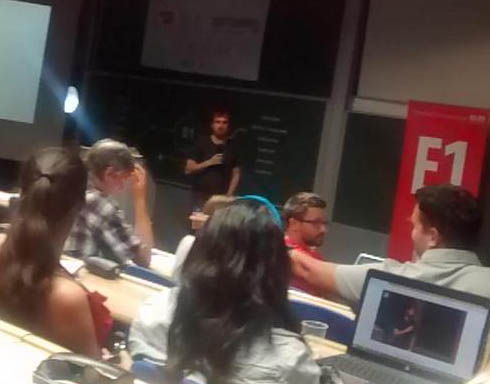 Florian Le Goff E1 Conference - Credit photo : @Jice_Lavocat
Florian Le Goff E1 Conference - Credit photo : @Jice_Lavocat
Florian Le Goff (9h37 - @madflo) gave what was, for me, the most interesting talk of the day. He shared many tips for early/advanced startup founders. After a brief introduction about the startup he recently sold, Florian went through the main the pitfalls he and his cofounder faced.
He started by referring to something business incubators which are far more common in France than startups accelerators. When you grow up in France, you are told that doing long studies and avoiding failure is the best for you. Hence, students usually spend years and years at the University and graduate without any appeal for trial and error (in Life or in Business). After these years, biz incubators are a perfect place for people who fear to fail. These public structures act as a safety belt and founders often feels more secure since they have “pseudo mentors” in the incubator. I use “pseudo mentors” because most of the time, these people are employees and never had to take difficult decisions for their own company.
Feeling secure for a founder is a good point. But remember about the “avoid failure” French bias : such situations could be toxic and prevent founders to move forward, to fail and therefore to learn.
Feeling secure could be toxic for founders as they can't fail and learn
Click to Tweet
His second point was about startup events and startup contests. In a word : don’t apply ! … Or apply once, just to see how it works.
Third he talked about decisions founders might take when they are on a tight budget : hiring interns. One again, don’t do it, except if the intern stays for a long period of time (> 4 months) and is a potential hire when he graduates.
I’d have loved to hear Florian talk longer on that topic. I hope I’ll have this occasion again in the future.
Ouvrons la science et les données de la Recherche
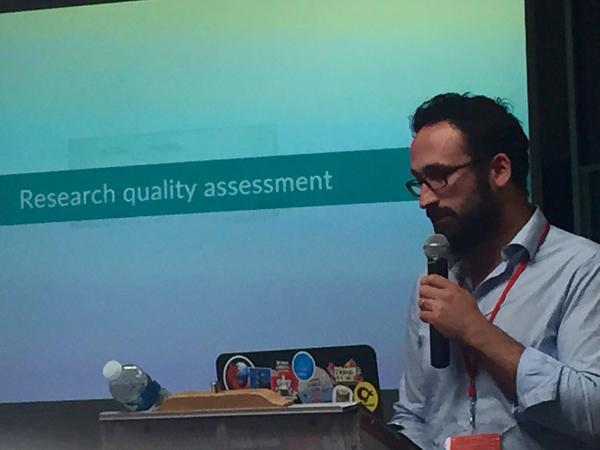 Julien Maupetit E1 Conference - Credit photo : @kevinpardo
Julien Maupetit E1 Conference - Credit photo : @kevinpardo
Julien Maupetit (www - @julienmaupetit) gave an introductory talk about Open Science. This is a really difficult topic and I would like to cover it in a separate post. His presentation was clear and he showed the various conflicts Open Science is raising. He introduced the concept of “publish or perish” (researchers needs to publish to stay in the academic race).
I wish Julien talked about the advanced some researchers do for open science, especially in Hard Science. For instance, Terry Tao’s collaborative problems are a neat example of what the Research could be tomorrow : people publishing openly about problems they are working on, and collaborating publicly toward the solution. In France, we invented COQ, an interactive theorem solver. Why won’t scientists keep the same spirit and try to combine collective and artificial intelligence to speedup problem solving. One could imagine public APIs where artificial agent could use the crowd data / hypothesis to perform all range of conclusions.
Etalab : presentation
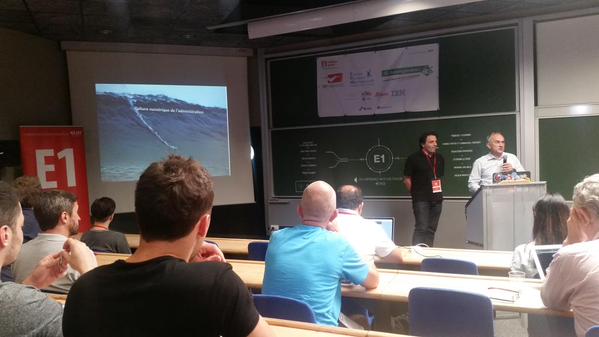 Etalab E1 Conference - Credit photo : @Tribaleo
Etalab E1 Conference - Credit photo : @Tribaleo
The last talk was given by Daniel Ratier and Emmanuel Raviart from Etalab. The two speakers were pretty entertaining and introduced us to the organization that Etalab (French Public agency for open data). It was really reassuring to see that, instead of being a slow machinery, France managed to set up an active department with skilled people.
Conclusion
It was the first time for me to attend E1 conference. I spent a really nice day and met lots of interesting folks.
I have not been involved in the organization this year (too many events made it impossible for me) but I hope that next year will be different, and if you read that, I hope you’ll be able to attend :-)